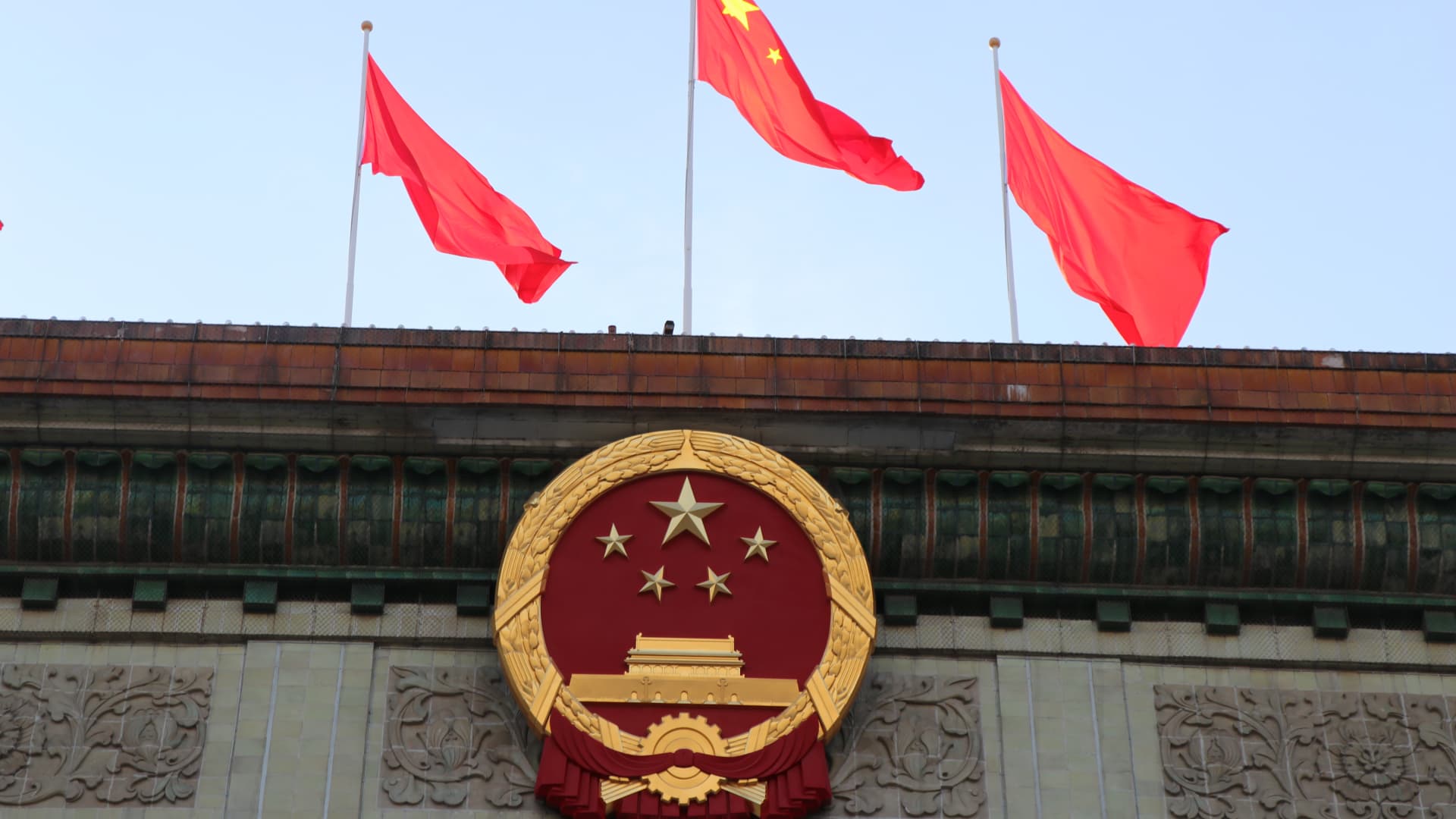Pictured here is the Great Hall of the People in Beijing, China, ahead of the 76th anniversary of the founding of the People’s Republic of China on September 30, 2025.
Anadolu | Anadolu | Getty Images
BEIJING — China’s top leaders on Thursday stressed their resolve to boost domestic consumption over the next five years, on top of widely expected plans to bolster homegrown tech.
That’s according to a state media readout of the closely watched “Fourth Plenum” meeting for setting five-year development targets. China on Thursday also confirmed that Vice Premier He Lifeng, who participated in the plenary meeting, will visit Malaysia from Friday to Monday for U.S. trade talks — as anticipation grows over a possible meeting between the U.S. and Chinese presidents at the end of the month.
Despite broad calls to bolster China’s international influence and “safeguard the multilateral trading system,” the readout did not mention major countries by name as the meeting focuses largely on domestic development.
China must “vigorously boost consumption,” the meeting readout said, according to a CNBC translation of the Chinese. The leaders elaborated on the need for consumption with calls to balance it with “effective investment” and “adhere to the strategic point of expanding domestic demand.”
“New demand will lead to new supply, and new supply will create new demand,” the report said. The leaders also called for effective implementation of policies to support businesses and “special actions” to boost consumption.
The tone indicates that China’s policymakers are taking a closer look at the relationship between economic supply and demand than they have in past years, said Zong Liang, former chief researcher at the Bank of China.
That change — which doesn’t come lightly in China’s ideologically driven government — still isn’t a green light for cash handouts. Even with muted retail sales since the pandemic, Beijing has steered away from directly giving consumers money, in contrast with U.S. stimulus checks in the wake of Covid-19.

The readout “signals a continued emphasis on investment — this time as a means to stimulate consumption — rather than a bold, direct push to expand consumption itself,” Yue Su, Beijing-based principal economist for China at the Economist Intelligence Unit, said in a note.
“We can therefore expect investment to focus more on consumption-related sectors and activities, such as improved urban planning, public services, and elderly care,” she said. Su pointed out that over the past decade China has heavily relied on investment for growth, leading to concerns about overinvestment.
In the last two years, China has sought to boost consumption with subsidies targeted at home appliances and certain other consumer goods. The country has also encouraged local governments to hold sporting events and other entertainment to boost spending.
Since the readout didn’t call for “vigorously boosting income,” Eurasia Group’s China Director Dan Wang is more cautious about Beijing’s consumption plans.
“It is just a wishful goal,” she said. “I can’t see fiscal commitment in this.”
The readout emphasized achieving the 2025 growth target of around 5% and other previously shared goals for 2027 and 2035.
That all implies annual growth of 4.6% through 2035, Wang said, noting it will be “very costly” to achieve. She expects that ultimately resources will be concentrated in high tech and emerging industries, with little improvement on the demand side while deflationary pressure remains entrenched.
China’s previous policy goals to become a global leader in electric cars, for example, have been criticized for encouraging companies to flock into subsidy-supported industries, resulting in a race to the bottom that’s then pressured industries in other countries.
A ‘significant leap forward’ in tech
Beijing this year has sought to address some of the excessive competition. But the country has meanwhile had to ramp up its technological development as the U.S. has increased restrictions on China’s ability to access advanced tech.
China’s top leaders on Thursday called for improving tech self-reliance. “We will strive for the next five years, to achieve a significant leap forward in [China’s] economic strength, scientific and technological strength, national defense strength, comprehensive national power and international influence by 2035,” the readout said.
It also called for developing a “strong agricultural nation” and “accelerating the establishment of a strong manufacturing nation,” while noting the need to maintain a “reasonable” proportion of manufacturing in the country.
The only mention of the ongoing property slump called for “high-quality development” of real estate. Beijing also noted it will work towards previously released plans to reduce carbon emissions.
Senior officials are set to share more details about the country’s upcoming five-year goals in a press briefing Friday morning, while a more comprehensive readout is expected in coming days. China typically doesn’t release detailed full five-year targets until its parliamentary meeting in March.






